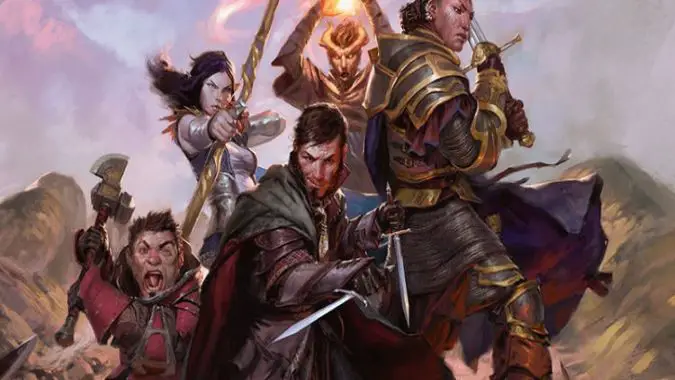How to decide what content to use in your D&D game

We’ve talked a bit about how to run a D&D game, and we’ll likely talk about it again, but since we’ve featured several Unearthed Arcana supplements and talked about books like the Explorer’s Guide to Wildemount, it feels to me like time to discuss a somewhat sensitive topic that every D&D group eventually confronts.
How do you, as players and as a DM, decide which D&D books to use in your game? What supplements, what playtest content, which sourcebooks and modules do you use? This is a subject with no simple answer — we can’t just say, “If it’s an official Wizards of the Coast product you use it” and be done with it for a variety of reasons, not all of them rules related. One of my favorite products for Dungeons and Dragons is Xanatar’s Guide to Everything, and it’s chock full of rules and options, all of them official D&D made by Wizards. And yet, I don’t always use Xanatar’s in my games. Why?
Because it doesn’t always fit.

There’s a lot under D&D’s hood
Dungeons and Dragons has a lot of moving parts. There’s a lot of game to the game, and that means there’s a lot that players need to know, and even more that Dungeon Masters need to at least be conversant with in order to run it properly. The three core rulebooks — the Player’s Handbook, Dungeon Master’s Guide, and Monster Manual — are each hundreds of pages long. You are likely not going to have all three memorized, and will be forced to use them like reference manuals from time to time. That’s just how it goes — the core rules of D&D aren’t terribly complex, but it’s still a lot to be expected to remember.
Now add in all the material not contained in those books and we’re talking a body of rules information several times larger than just those books. When we’re talking supplements and adventures and campaign guides, just the official Wizards of the Coast material is likely 10 to 20 times larger than the core. New races, new subclasses, even the occasional new class — at least two, the Artificer and Blood Hunter, and very setting dependent appearing in Eberron and Exandria respectively — and that’s not even including all the playtest material in Unearthed Arcana. You may love the Rune Knight, but it’s still just one of many new subclasses that can and often are changed while players are still playing them.
This is a lot for a group to keep track of. Some DMs don’t want the hassle and simply say core only, and they’re not wrong to do so — they’re making a choice to keep their game on track and their players and themselves from being overwhelmed. Also, let’s be clear, there’s always that one player who is absolutely a genius at finding that one unintentionally overpowered thing and pushing it into game-breaking territory. I still remember the D&D game I was in where an actual employee working on D&D threw up his hands and utterly banished the entire Psionics rules due to a player just being too good at abusing the way a rule was worded to give himself something like ten actions in a round. Whenever the initiative came round to his character, the game would literally shudder to a stop as he decided his ridiculous surfeit of actions.

Use more complexity when it benefits you
Now, as a DM, I tend to rule on the side of letting people try out whatever weird character concept they come up with, and that includes playtest content and that one weird book everyone forgets came out with a character option that lets Fighters dual wield hand crossbows. If it breaks the game, I’ll made adjustments on the fly. But that’s partially because I am very comfortable improvising the whole game and partially because I gave up on actually having the rules memorized three editions ago, and nowadays I unabashedly admit when I’m wonky on what a spell or ability does or what the rules for a specific circumstance are — I have to use tables to remember what conditions are in 5e because there’s a lot of them. So for me and my game style, I can absorb letting in everything, because I’m comfortable telling a player “Sorry, but your Sun Soul Monk/Rune Knight Fighter is just OP as heck and you’ll need to redesign it without Rune Knight abilities” if that comes up.
This does not work for every group. You should always be up front with your players about what you’ll allow and what you don’t want to deal with. In general, even official Wizards of the Coast content should always be viewed with the eye of “If this doesn’t work for us, we’re tossing it.” This includes the core rulebooks, by the way — if your group is running a low magic gritty crime on the streets campaign and classes like Warlocks and Wizards are constantly breaking the mood, maybe you shouldn’t use them. Similarly, if you’re blatantly stealing from the various media that has kids learning how to be magicians at a magic school, maybe that one guy who wants to play a Fighter needs to commit to playing an Eldritch Knight or come up with a different character concept.

Always bring your whole group in
In general, never just assume that, as an example, the new Theros book is available in your campaign. Talk about it with your DM, and if you’re the DM, always be willing to lay out for your players why you won’t be using Dunamancy from Wildemount or the latest Psionics rules from Unearthed Arcana. Warforged are great. I love Warforged. But they might not fit your campaign, and you’re under no obligation to use them, or Dragonmarks, or other flavor from Eberron. Look at any potential new rules not only with an eye to how they’ll fit into your campaign, but also with an eye on how much trouble they’ll make for you as players and/or the DM. I was in a D&D game that deliberately stripped the game down to three classes, essentially Fighters, Rogues, and Clerics, and it was a blast. I’ve also been in games that used literally everything, a real kitchen sink of a campaign, and I loved that game a lot. As always, make the decision with your players input and their interests in mind.
The whole game exists to help you have fun telling cool stories. Use whatever you’re comfortable with to accomplish that, and never feel forced to allow something that detracts from that. I’m using the everything and the kitchen sink approach for our monthly D&D games, and that works for that group. But if it ever stops working, I’ll make a change, because we’re playing the game to have fun and that’s my primary goal.
Please consider supporting our Patreon!
Join the Discussion
Blizzard Watch is a safe space for all readers. By leaving comments on this site you agree to follow our commenting and community guidelines.
 @MatthewWRossi
@MatthewWRossi



